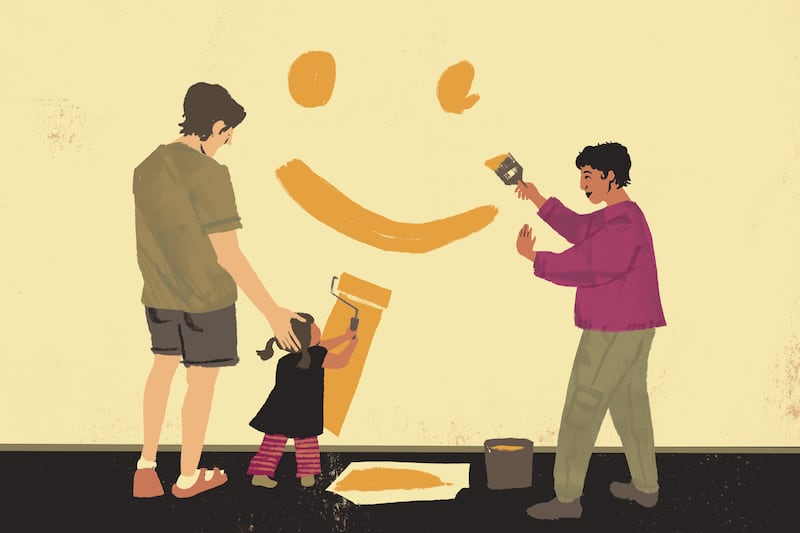“Her tired mind surveyed her luck — a home, the children, Adam. In so many ways it was her dream.” But Coralie was not happy. “Something was wrong,” thinks the protagonist in the new acclaimed novel “Consider Yourself Kissed.” “Mother, writer, worker, sister, friend, citizen, daughter, (sort of) wife. If she could be one, perhaps she could manage. Trying to be all, she found that she was none.” Thus begins yet another installment in the litany of recent fiction and nonfiction devoted to modern women’s grievances. (A most tiresome, albeit more explicit version of this story, called “All Fours,” came out a few months earlier.)
Coralie begins as a single woman sad about being alone. Then she becomes a woman living with a man she loves and his daughter. But then she is sad they do not have a child of their own. And then she is sad they do not have a second child. And then she is sad because with three children, she doesn’t have enough time to pursue her writing career. And her husband doesn’t pitch in enough. And he works too much, but also she wants to spend more time with her kids, so he needs to work more. And she needs to spend time away from him in order to rediscover her true self. “How could the world … be made fair,” she wonders, “when two people who loved each other couldn’t even manage a life?”
Maybe the world isn’t “fair,” but Coralie’s life is hardly evidence of that. And is this really the question that upper-middle-class educated women with husbands and children and nice houses need to be asking about themselves?
But all of these complaints about husbands and children and work are not restricted to individual grievances, because, well, that might seem petty. Instead, they are complaints about the system, about the institution of marriage, capitalism, the patriarchy … you name it.
If you want to read the nonfiction version of these complaints, look no further than two recent features in The New York Times. The first, from a couple of months ago, was a video series called “Motherhood Should Come With a Warning Label.” More than 2,000 women responded to a request from the paper to “tell us about your journey to motherhood.” The women in these videos are angry. They are angry that they had less successful careers as a result of time spent with their children. They are angry that they have less money in their retirement accounts, that their partners didn’t suffer similar consequences. It is excruciating to listen to all these women talk about how the system is stacked against them, despite the fact that many of them have good jobs and loving families. And one can only imagine how young women at the start of their adult lives must feel about hearing all this.
Which brings us to the second New York Times feature, published last week, “The Trouble With Wanting Men.” Unlike the earlier piece, this one was focused less on the career frustrations and more on the men they are stuck with. “Men are what is rotten in the state of straightness,” Jean Garnett writes. “And why shouldn’t we have an all-inclusive byword for our various pessimisms about them? Domestic pessimism (they still do less of the housework and child care); partner-violence pessimism (femicide is still gruesomely routine); erotic pessimism …” etc. etc.
Even the “good, sweet men,” Garnett notes, are really not very helpful. She laments: “Most of us can neither renounce our heterosexuality nor realize a significant renegotiation of its terms.”
How is a 20-year-old woman supposed to take this? You might assume that the solution is just to forgo finding a partner or having children. It’s not just that it’s heartache, because even the most naïve young woman 20 or 50 or 100 years ago would be aware of the potential for unhappiness or even tragedy when she decided to put down roots.
It’s that the whole system is out to get you. Sure, it may seem as if women have made progress, but these novelists and journalists are here to tell you that you are destined for misery. The result is a self-fulfilling prophecy. Instead of finding someone you love earlier and trying to build a family together, you will put your career first, rejecting multiple decent, loving men because it’s too early to settle down. If and when you finally do enter a partnership and have kids, you will walk around with a chip on your shoulder wondering why you have to cut back on work to be with your kids — even though chances are you actually do want to be with your kids more. You will blame this all on your partner or your boss or the world. Rinse and repeat.
Part of growing up is realizing that we have autonomy, that our life outcomes are not just a product of structural forces acting on us. In reality, women have a lot of choices open to them, but there are only a few that will genuinely make them happy. Instead of giving them the message that they are destined to be miserable and it’s someone else’s fault, maybe we could find a fictional or nonfictional portrait of a woman who manages to find fulfillment in an imperfect world.


